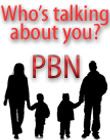Wonderbaby speaks Spanish. Sort of.
She speaks Spanish - is being raised to know some Spanish - because I speak it. I'm not Spanish, nor any strain of Latin, but I did live for a couple of years in Spain and because some of my very dearest friends (Wonderbaby's godfamily) is Spanish and because we're all going back to live there one day (well, that's the dream, anyway.) So she's going to need it.
So far, her education in Spanish has consisted of me reading to her in Spanish, listening to Spanish and Latin-American music with her, and - not least - using the services of a part-time Spanish-speaking nanny. And it's been more or less successful: Wonderbaby communicates easily with her wonderful nanny, who has spoken to her only in Spanish since WB was nine months old. (And, from time to time, WB tosses in some Spanish with her English just to keep things interesting: bye-bye sometimes becomes adios (or, 'ciao,' for some Italian flavour), cow becomes vaca, water becomes agua, etc., etc.) But I've worried about how we'll keep this up once the nanny goes (which she must, because we can't afford to keep her full-time) - I'd read that children learn best when one person speaks the second language to them exclusively, and although my Spanish is good, I don't want to use it all the time.
Enter The Bilingual Edge, which tells me, to my very great relief, that this is not necessary. I can use all variety of methods to keep up WB's language skills - music and reading, in addition to conversational speaking. Indeed, TBE insists that parents don't need to be native speakers of a language in order to introduce it to their children. Rather, parents just need to be committed to exposing their children to that language at any opportunity - and willing to perhaps look a little silly, sometimes, doing it (as when, as the book recommends, reading in a language that one does not know. My husband - who does not speak Spanish, but who gamely tries to read it to WB, found this very reassuring.) And it dispels the myth that 'mixing' languages (one person speaking more than one language to a child) is counter-productive to language learning. (Children, they insist, sort through differences in language on their own, and this exercise can actually be developmentally advantageous.) Which, again: big relief.
This, I found, is the book's singular strength - it aims to help and encourage parents who are confused by the whole issue of language learning, parents for whom such training is desirable but not straightforward. If we were truly a bilingual household, and spoke Spanish regularly in front of WB, I wouldn't concern myself too much with 'how to's'. But we're not such a household, and because of this - even though we're not exactly an entirely unilingual household - we needed some help. And that help and encouragement was very welcome - not least because it came wrapped in the message that learning second languages needn't be, nor should be, stressful or challenging. Just welcome that language into your home, and enjoy it. The rest will fall into place.
How often do you get to hear that message in relation to your child's education? That's what I thought.
(With thanks to the Parent Bloggers Network!)
Friday, August 17, 2007
Subscribe to:
Post Comments (Atom)




1 comment:
HBM, you have made my day. I too worried that I was not speaking enough Spanish with Isa. Even though I was born in Latin America, I was raised here and in many ways consider English to be my first language. This means that there are many times when it is the language that comes out of my mount first. I am so glad that it is okay to mix it up.
Post a Comment